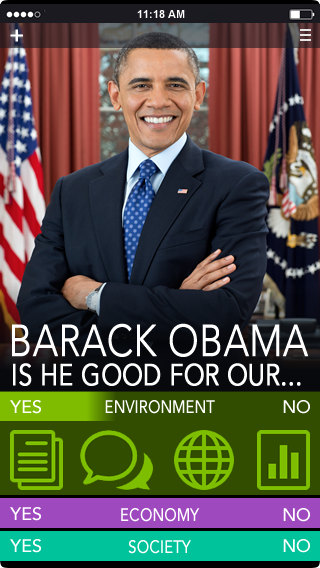Developers of WePowerApp, launching unofficially by invitation February 18 and then in Israel on March 1, call it “the world’s first mobile citizens network.”
“No generation in history has been more connected while at the same time so completely disenfranchised. This provides a unique opportunity for disruption,” says CEO Adam Tucker.
WePowerApp will give iOS, Android, and Blackberry users an intuitive smartphone interface to add and vote on issues, link articles, post comments and record short videos to express their views on topics by answering three questions: Is this good for our society? Good for our environment? Good for our economy?
Whether you want to weigh in on fracking or same-sex marriage, gun-control laws or climate change, WePowerApp would be a go-to space to learn more, define your position and connect with likeminded people via interactive maps showing voter concentrations and patterns.
“When we know what our neighbors think, we’re more likely to stand up for one another,” says Tucker, who spent four years working to expose the use of diamonds in money laundering and conflict. “When a critical mass of people unites behind a common cause, it can be a powerful statement.”
Why is the global debut set for Israel?
“We believe Israel is the best place to launch because it’s one of most highly connected environments; 70 percent of the population has smartphones,” says Tucker. “Israelis are very vocal, and this is about sharing your opinion.”
Besides, he points out, “The world is hyper-focused on Israel, so any traction we make there will get us exponential exposure.”
Tucker, a California resident whose parents met on a kibbutz, is working with CTO Matt Leebert in Oregon and CMO Ariel Gordon in Haifa. “The first phase of our app is to identify problems. Our next phase will providing tools for collaborating to solve them,” he predicts.
Recognizing the potential for WePowerApp to be hijacked by haters, Tucker says, “We will define the culture by selecting the initial topics for the network, and by moderating topics until the culture has been adopted by the users and peer review is enough to maintain civility. One of our goals is to demonstrate that extremists are outnumbered and their behavior is not welcome.”
Topics about race, religion or nationality won’t be allowed, and certain words and word combinations will be verboten. For example, “How do you feel about Catholics” isn’t an acceptable topic, but “How do you feel about Catholicism’s ban on contraceptives” is fair game.
Leebert is developing algorithms to prevent and flag questionable topics and content, and the app will include user and peer reviews.
“Extremists are already united. Our goal is to unite the rest of the world by allowing people to identify shared and common struggles with their neighbors,” says Tucker. “We believe the best way for people to transcend their differences is to work towards solving common problems. You can’t change system without providing a better alternative.”















